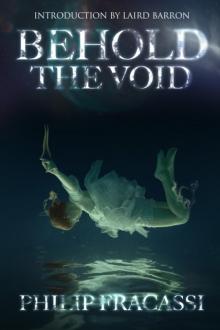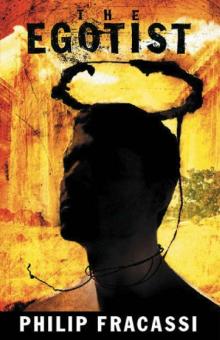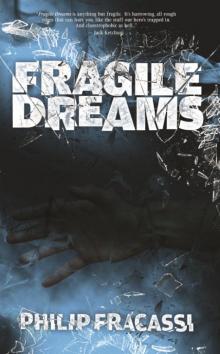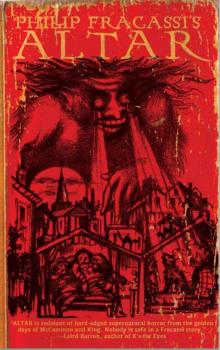- Home
- Philip Fracassi
Behold the Void
Behold the Void Read online
BEHOLD THE VOID
By
Philip Fracassi
JournalStone
Copyright © 2017 Philip Fracassi
“Soft Construction of a Sunset,” copyright © 2017, original to this collection
“Altar” copyright © 2016 Philip Fracassi, first published as a novelette
by Dunhams Manor Press
“The Horse Thief,” copyright © 2017, is original to this collection
“Coffin” copyright © 2016 Philip Fracassi, first published in Strange Aeons Magazine
“The Baby Farmer” copyright © 2017 Philip Fracassi, first published in Murder Ballads, edited by Mark Beech; Egaeus Press
“Surfer Girl,” copyright © 2017, is original to this collection
“Mother” copyright © 2015 Philip Fracassi, first published as a novelette by Dunhams Manor Press
“Fail-Safe,” copyright © 2017, is original to this collection
“Mandala,” copyright © 2017, is original to this collection
All rights reserved. No part of this book may be used or reproduced by any means, graphic, electronic, or mechanical, including photocopying, recording, taping or by any information storage retrieval system without the written permission of the publisher except in the case of brief quotations embodied in critical articles and reviews.
This is a work of fiction. All of the characters, names, incidents, organizations, and dialogue in this novel are either the products of the author’s imagination or are used fictitiously.
JournalStone books may be ordered through booksellers or by contacting:
JournalStone
www.journalstone.com
The views expressed in this work are solely those of the authors and do not necessarily reflect the views of the publisher, and the publisher hereby disclaims any responsibility for them.
ISBN: 978-1-945373-49-7 (sc)
ISBN: 978-1-945373-50-3 (ebook)
ISBN: 978-1-945373-51-0 (hc)
JournalStone rev. date: March 10, 2017
Library of Congress Control Number: 2017930776
Printed in the United States of America
Cover Art—photo images & Design: Chuck Killorin
Edited by: Aaron J. French
For Stephanie
ACKNOWLEDGEMENTS
Thank you to Laird Barron for the humbling introduction, and for first putting me on this dark, twisting road and continually guiding my direction.
Thanks to Christopher Payne for allowing me onboard the wonderful mothership he’s created.
To Jordan Krall, Christopher Slatsky and Ted Grau for believing in my work from the get-go; to John Boden and Michael Wehunt for double-checking my grotesque math on some of these tales; and to Adam Nevill, Paul Tremblay and Ralph Robert Moore for supporting the hatchling stories.
Additional thanks need to go out to Armando Saldana Salinas, Elias Combarro, Lidia Porto and T. Frohock for translation assistance; Spencer Hammond for advising me on my British terminology; and to the wonderful editors who have published my stories this past year: Jordan Krall, Joe Zanetti, Dunhams Manor Press; Mark Beech, Egaeus Press; Rick Tillman, Kelly Young, Justin Steele, Strange Aeons Magazine; Travis Neisler, Ravenwood Quarterly; Aaron J. French, Dark Discoveries Magazine; Mike Davis, Matthew Carpenter, Alex Kreitner, Lovecraft eZine.
A shout-out to my agent, Jason Yarn, for having my back, and to Jose Angel de Dios and Maite Aranda Morata at Dilatando Mentes Editorial for the upcoming Spanish translation of this collection.
Lastly, hugs and kisses to my parents and to my family—Stephanie and Dominic—for their constant, unflagging love and support.
Endorsements
“Philip Fracassi is a master craftsman of the dark tale, and like a true craftsman he constructs his stories with cunning and care. Each of his creations is unique; he never writes the same story twice. Yet each shares certain commendable traits: believable characters, perfectly-drawn settings and situations. These are living, breathing people with relatable lives. We know them. We ARE them. Then he adds that Fracassi magic, a sense of discomfort, unease, and mounting tension that pervades every paragraph, every line of his stories. Even when all appears well, there is trouble brewing quietly beneath the surface, building steadily until the pages positively drip with menace. Read the stories and see for yourself. Your grip on the book will tighten. Your breath will come faster. Your heartbeat will quicken. After a while you may even want to put the book aside, afraid to keep reading, terrified to know what’s next. But you’ll have no choice. You’re in the master’s grasp, and he won’t let go until you’ve seen every last horrifying thing he wants to show you. Philip Fracassi is a rare talent, and this book is a marvel. We are lucky indeed to have both of them.”
—Paul F. Olson, author of Whispered Echoes
"This is it—a collection of dark tales that will not only chill you to the bone but will immerse you in a world of eerie atmosphere, poignant prose, and characters who are just a tweak off-center. Fracassi's BEHOLD THE VOID is the perfect read for horror fans who expect authors to raise the bar and redefine what horror fiction means. A royal treat!"
—Ronald Malfi, author of The Night Parade
"Phillip Fracassi confirms his genius for genre writing with the release of his first collection, BEHOLD THE VOID. At a time when so many stories are slight on substance, providing more of a shrug than a shudder, Fracassi's tales are strong, complex, satisfying, fully-developed narratives with beginnings, middles and ends; and characters developed with enough detail that you'd recognize them if you saw them on the street. His stories stay in your head. There's a great deal of truly unsettling horror in this collection, and page-turning tension, but unexpected moments of poignancy as well. As in the best collections, certain themes, particularly the idea of transformation, thread through many of the stories, giving the collection a "the parts are greater than the whole" boost. Philip Fracassi is one of the most exciting new voices I've read, and I am certainly looking forward to seeing what he does next. BEHOLD THE VOID should be on the shelf of every horror reader. It's that good. Highly recommended."
—Ralph Robert Moore, author of You Can Never Spit It All Out
Introduction
By
Laird Barron
Chisel this into the metaphorical tombstone of some luckless character starring in Behold the Void: Nobody is safe in a Philip Fracassi story. I warned the world with that very jacket copy quote for his limited-edition chapbook, Altar (the novelette is reprinted herein).
What does that mean—nobody is safe? It means Fracassi is a student of modern roots horror in the mold of Stephen King, Richard Matheson, and Norman Partridge, a trio of heavyweights who typify a gloriously ruthless approach to storytelling. Guys unafraid to kill the kid, destroy the world, or at least peel aside the façade to reveal the real, festering darkness. The kind of guys who lace readers into the track shoes of everyday Joes and say, the big bad is on its way. You gonna run, or are you gonna fight? Don’t count on a happily ever after, fool. Modern horror covers a wide range in terms of theme, mood, and affect; Fracassi’s bailiwick at this point in his career is physical and emotional confrontation with a dose of the surreal; and of violence and shock made almost palpable.
Behold the Void features a dirge of murder ballads fit to put Nick Cave and the Bad Seeds on notice; community swimming pool portals to the outer dark; a horse thief traveling a midnight highway to damnation; revenants borne up from oceanic depths; a timeout room cum killing jar for when mama’s dark side overcomes her maternal instincts; and a hell of a lot more. Nine stories anchored in tradition, yet all the stranger as each inevitably drifts from well-traveled byways into an increasingly hostile wilderness. Horror tropes slip and twist in F
racassi’s hand, like bloodied knife hilts. The results are jagged and often transfiguring.
To come to grips with a Philip Fracassi joint, you must cast your glance backward toward the 1970s and 1980s and the heyday of North American category horror. Think tragedy in benighted suburbia. Think of bad, bad things (supernaturally bad things, more often than not) happening to good people (and some not so good people, and a few people in the exactly the right place at the wrong time). Think Cujo, Thinner, I Am Legend, and Rosemary’s Baby. Think Robert R. McCammon and Rex Miller, both of whom freely navigated the fringes of splatter punk and hardcore noir. Now, jump ahead three decades and imagine golden age traditional horror merged with the mind-bending visons of contemporary/postmodern weirdmongers such as Gemma Files, Kaaron Warren, and Brian Evenson.
Horror and weird fiction are ascendant a decade and a half into the 21st Century; an abundance of market opportunity and artistic talent has inspired a surge of creativity unrivaled in the modern days of the genre. As readers, we’re relatively spoiled by the consistency of what’s on offer. However, I predict Fracassi will hit the unsuspecting field like a left hook when this collection arrives in early 2017.
Fracassi is new on the scene, although if you’re a savvy fan with an ear to the ground, you’ve heard the rumblings. The audience at large is in for a revelation. Despite the fact it’s a powerful book by an accomplished author, Behold the Void hasn’t been presaged by numerous short fiction sales over the past five or six years as per the usual gestation period of a debut collection. Only a few of us behind the scenes have seen this coming and it’s prime to set unsuspecting fans and critics back on their heels.
Publishing tends to move at a glacial pace, from conception to execution, from sale to publication, and, as a rule, from distribution to audience awareness. Fans and critics deal with ever-increasing backlogs. As a consequence, an author might struggle for several years to achieve anything close to a readership.
An industry constant you can set your watch by: writers who break into professional genre publishing via the short fiction route usually hone their chops in magazines and anthologies. These are the proving grounds where tyros solidify narrative mechanics, establish relationships with editors and publishers, and develop an audience along the way. Eventually, if all goes well, a writer will accumulate enough quality stories to form a collection, picking and choosing a coherent theme or genre niche. That’s the basic formula and a proven, if conservative method young writers should be inclined to follow.
Meanwhile, Fracassi paid his dues in the Hollywood salt mines as a screenwriter. Conventions are made to be upended, and this book is Exhibit A evidence of why this is so. Most of the stories between these pages are, in fact, the result of a white heat development cycle. I know this for a fact because I’ve observed Phil’s progress closely over the past several years and was in contact with him as he wrote the disparate elements of this book and eventually forged them into a dark and symphonic whole.
The transformation has been remarkable to watch and a particular joy to this jaded old heart. Of the many supremely talented horror writers working today, few possess a skillset this complete. Fracassi is tough, dedicated to his craft, and is far cleverer than the average bear. He knows exactly how to construct a story—how to open it, pace it, and see it off the final page. He understands how to ground narrative in the quotidian before springing the horrific twist or launching a supernatural intrusion for maximum effect. Indeed, Fracassi’s literary punch will land seemingly from nowhere--but don’t be fooled. He’s been winding up for a long time.
When you open this collection, you’re headed down a dark alley within the precincts of the Twilight Zone. It’s the kind of place where the wrong people get hurt; hazard is everywhere and it doesn’t play favorites. The complacent won’t find refuge here on the threshold of the void. Nobody is safe and nothing is sacred. Enjoy the ride.
--Laird Barron
Stone Ridge, NY
December 18, 2016
BEHOLD THE VOID
“There is, in every event, whether lived or told, always a hole or a gap, often more than one. If we allow ourselves to get caught in it, we find it opening onto a void that, once we have slipped into it, we can never escape.”
―Brian Evenson, Fugue State
Soft Construction of a Sunset
In the dream he is sitting on a thin red blanket atop grass that’s dark as green shade. The sun is setting behind the soft slope of a hilltop in the distance, the earth’s smooth texture like the tender skin on a woman’s thigh, the hilltop spangled gold like a honeyed leg dewed with moist sun. He imagines the rest of her body lying across the horizon, the head a distant mountain, her hair waterfalls flickering in the dying light, as if infused with diamonds. He imagines the curve of her shoulder, the slopes of her breasts, the dip and rise of her earthen hips. He wishes she would shrink and join him on the blanket, a green meadow of woman curled around him, nibbling his neck and ears with teeth made from buried emeralds, eyes blue fire of a perfect sky, molten lips melting into his. He closes his eyes on the dusk and allows his imagination full control of the vision; he smells her, the fresh scent of minerals and low-flying breezes. He inhales as he kisses her, then opens his mind’s eye to see those pools of blue sky staring back, the fine hairs of her skin lifted and waving, rippling against him like a field of blonde heather, her waterfall hair falling, falling into his fingers as he clutches at her, wetting them, his face burning against hers and, when their bodies intertwine, he roots to her, and they become one.
Cold air prickles his neck and he opens his eyes, sees the sun has almost set; the horizon of her sinks into shadow, ready to sleep. She bleeds into the night, her essence coating the dark heavens. He lies on the blanket, joining her as part of the dark, and feels her stars rush into his nose and mouth, filling him. He sighs and sleeps forever… finally at peace, finally one with love.
The stretched black canvas of night gives a thrum; the stars vibrate on its surface. Crashing thunder fills the dark, the sound of a god-like beast fighting to break through the sky.
His eyes jerk open and she rushes out of him. He looks up at the stars falling away, exploding in the atmosphere as the sound comes again, earth-shattering. He stands, fingers curled into fists as the earth crumbles and she blasts away into meteoric bits.
The sorrow he feels is unreal. He wants to scream but the shattering sound comes again, a pounding herd of elephants the size of planets, a thunderstorm of horses trampling the heavens. Lightning crashes, blinding white.
He wakes, gasping. His body wracked with spasms, his skin melting with sweat. He looks to the windows. Still night. The sound?
It comes again. A piercing rattle… a ringing. He takes a deep breath, looks around his small bedroom. The phone jangles on the nightstand and he rips the receiver from the hook.
“My god, yes, hello?” he says, almost gasping the words in his alarm and confusion.
A voice screams into his ear and he holds the receiver away, wincing. “Tom! You have to help me!”
“Who is it?” His eyes find the digital clock. It’s just shy of dawn.
“Tom? Oh god, you… oh Jesus, this can’t be real! Please, Tom, oh fucking hell, Tom. You have to help me, man!”
Tom’s brain slowly fills in the blanks as his consciousness becomes more alert. The dream is fading, but he makes an effort to hold on to pieces, fragments of the torn canvas, rips of color torn from the painting like snatches of words from a book. He tries desparately to hold on… the way she wrapped around him, the way her stars flooded his mouth…
“Help me, Tom! I’m in hell, man… oh, god, my brain!”
The last whispers of her fall away and Tom’s attention is forced back to the call, to the hysterics, to reality. But what reality is this? Pieces begin to fall into place. He swings his legs out of the bed, forces himself to sit up, to think. He knows the voice.
“Marcus?”
“Yes, yes…” Marcus s
ays, sobbing now, his voice hitched and broken by great swells of despair, of fear.
He sounds insane, Tom thinks. A spear of terror pierces his guts. Oh no, oh no, oh please no…
“Marcus, what happened? What the hell is wrong?”
Marcus is breathing heavily. Tom can picture his best friend’s face, twisted and snarled in savage despair, smeared and wet with tears and snot and sweat, his black hair matted down from his running a hand over it, the way he always did when he was upset.
“It took me three tries to dial your number,” he says absently, as if talking to someone else in the room, someone at the other end of their connection. “I can’t see the phone, the numbers… I don’t dare look. Not again. Oh god, Tom, please…” He’s sobbing again. “You have to help me. You have to come over here!”
“Over? It’s… Marcus, it’s five in the morning.”
“You don’t understand, please, man, this… this… oh, god, this can’t be happening!” He nearly screams the last few words.
Tom feels that stab of fear once more.
“Marcus, tell me what’s going on. For god’s sake, stop blubbering and take a breath. Tell me what’s happened. Are you okay? Have you hurt yourself?” And then, keeping his voice steady, “Is it Christine?”
“What?” Marcus says, as if surprised, or confused. “Oh man, look, you need to get over here right now. I’m fine, everything will be fine, right? But you need to listen to me. You need to get up, get in your car, and get fucking over here right now.”

 Behold the Void
Behold the Void Sacculina
Sacculina The Egotist
The Egotist Fragile Dreams
Fragile Dreams Altar
Altar